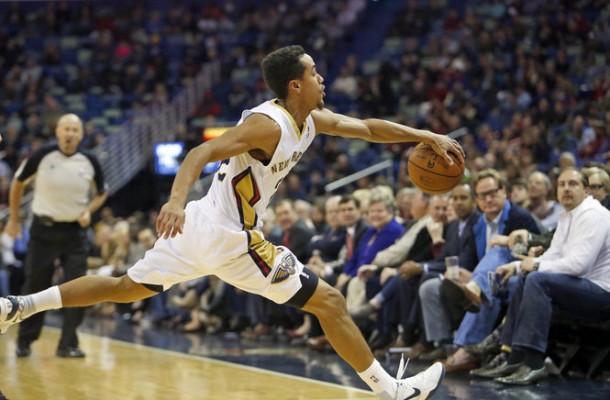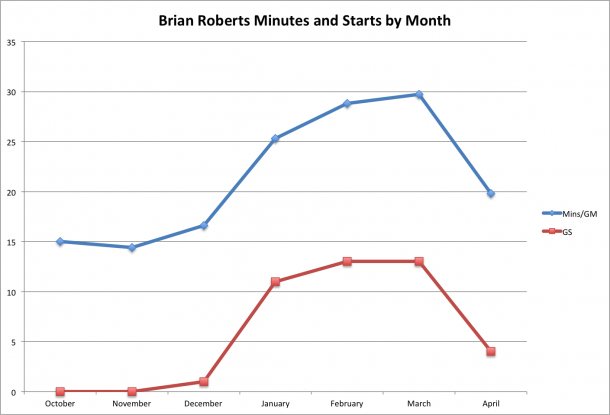Writing a Brian Roberts 2013-14 season review is a tricky thing. He isn’t a particularly unique player, but he splits fan opinions like crazy. Some love him, while others love to hate his defense and ball hogging. Let’s look at the facts, the raw numbers, and the data to see how Brian Roberts actually preformed this season.
Background
Last season, Roberts was sort of the resident feel good story for the Hornets. He had a long winding road to the NBA, which included stops in the D-league, Germany, and Israel. Add to that a diminutive frame for an NBA player, and you got yourself a fan favorite.
That is pretty much what Brian Roberts was his first season in New Orleans. He didn’t play great by any stretch, but he was an excellent bargain and an average back up guard. He contributed on offense despite shooting a bit too much, and he struggled on defense. Again, this is about what everyone expected or could have hoped for when he was signed with the team.
By 2013-14, however, things had changed. The Pelicans added guards Tyreke Evans, Jrue Holiday, and Anthony Morrow to a backcourt that already included Eric Gordon, Austin Rivers, and Roberts. All of the sudden, the Pelicans had too few minutes for too many players, and it seemed like Roberts was the odd guy out. He certainly wasn’t as talented as Holiday, Evans, or Gordon. He was a good three-point shooter (2012-13: 38.6%), but he wasn’t as good as Morrow (career: 43% including 2013-14). And he didn’t have the youth or potential of Rivers. That seemed like the end of big minutes for Roberts. I actually thought it was kind of sad. He was a guy you loved to root for, but he was pushed out as the roster got better.
Production in 2013-14
Well, at least that is not what I thought would happen. See, I’m not sure if you heard about it, but the Pelicans had some injuries, which resulted in Roberts starting 42 games. Yes, more than 8 times as many games as he started the previous year, and somehow he ended up being 5th in minutes played on a team with Jrue Holiday, Austin Rivers, Jason Smith, and Ryan Anderson, who all played fewer minutes than Roberts.
Before, I get to the data and nitty gritty of the season, I want to offer a synopsis of Roberts’ season, “He played much too large a role due to factors beyond anyone’s control, and he struggled. In a smaller role, he could have been successful.” I think that is pretty much the tagline for his season, but let’s keep going.
The problems started this season when injuries started happening and guys started going down. Take a look at the graph below to see how Roberts started playing more minutes as the season went on. His minutes go back down in April as he faces a few injuries himself.
The weird thing about Roberts’ is that his raw numbers do some goofy things when he plays more minutes. The expectation from most would be that his numbers should decline as he plays more minutes, but some of his best months in terms of shooting were January, February, and March. The table below separates his numbers as a starter and reserve. You can see that he actually shot a better percent by every measure as a starter. If you go even further into the data, which I won’t show here, you see that there isn’t that much of a correlation between his individual production and the amount of minutes he plays.
| Games | Mins | FG% | 3P% | FT% | TS% | USG% | ORtg | DRtg | +/- | |
| Starter | 42 | 28.9 | 0.431 | 0.362 | 0.945 | 0.536 | 20.9 | 105 | 115 | -7.7 |
| Reserve | 30 | 15.1 | 0.39 | 0.353 | 0.929 | 0.513 | 19.2 | 107 | 113 | 2.3 |
On the other hand, his individual offensive rating, defensive rating, and plus/minus were much worse as a starter. This may be telling us that the real problem when Roberts started wasn’t Roberts, but those around him. That is probably unlikely. Sure, a lot of factors contribute to a player’s production, however we have seen enough of Roberts to know that he is a decent but limited player. Really, all this data is telling us that Roberts shot better when he started and played more minutes. It doesn’t tell us how Roberts playing more minutes affected game outcomes or the team’s performance. He may be individually better when he plays more, but the team might be worse when he plays more than it would have been if a guy like Holiday had gotten those extra minutes.
All of that is based on looking at the season as a collection of 72 data points. If we drill into each of those data points individually, we can find some other results. Most of Roberts’ best games came early in the season, when the team was healthier. That lends some credence to the idea that Roberts production was more of a function of those around him rather than the minutes he played. It also gives some legitimacy to the idea that his best role is a limited one.
The one major criticism about Roberts is that he holds on to the ball too long. He slows down the offense. The ball stops with him. Well, there SportsVu data suggests that this critique may actually have some validity. Roberts is 2nd on the team in terms of time holding the ball per possession behind only Holiday. He actually possessed the ball around the same time per possession as Monta Ellis, which is bad considering the talent gap between the two.
In my ideal world, Roberts is a shooter off the bench. He comes in for a spark to give you a few quick points when you need it, but ideally, he isn’t even running your offense. He is just a guy on your roster that can be used in a quick spot. I think that a lot of people, including some on the Pelicans staff, would agree with me. The problem was that we didn’t have the luxury of an ideal world this season.
Having said all of that, I have to mention that his one elite skill set, free throw shooting. His shooting from the line was on full display this season as he led the league at 94%. That is a staggering number, and he deserves a lot of credit for such a phenomenal performance all season.
Outlook
Roberts made an assumed $788,872 this season. By NBA standards, that is quite low. For some perspective, that is probably what Darius Miller made this season, and it is about 5.5% of what Eric Gordon made. So you can get as frustrated as you want when he struggles on defense or dribbles too much, but you always have to admit that he has been a bargain these last couple of seasons.
Roberts will be a restricted free agent this offseason with a qualify offer at 3.4 million due to the number of games he started this season, which is probably much higher than his production. Hoopshype.com ranks him as the 16th best point guard in this free agent class, but I can’t imagine that a team will purse Roberts aggressively. I’m also not sure retaining Roberts is a high priority on the Pelicans offseason to do list. Roberts has been a great player for the Pelicans, and I’d be happy to keep him on the team. But with the Pelican’s depth at guard and his relatively expensive qualifying offer, its hard to see a role and roster spot for Roberts in the future.


8 responses to “Season in Review: Brian Roberts”
I don’t think Roberts qualifying offer will be an issue; no one will give it to him. Otherwise, I completely agree with this article, especially the conclusion.
Don’t bring him back cause Monty will start him over holiday for basketball reasons
I think they may bring him back, but only for the minimum….
PelicanSaints
I think the only option for the Pelicans to consider is to bring Roberts back for cheap. I don’t believe paying him an additional $150+K over his minimum is a big issue. (The NBA minimum salaries for 2014-15 for players with 2-8 years of NBA experience are all within $500K of each other, and Robert’s QO, without starting those last few games, would have been about $160K over his minimum salary based on his years in the NBA.) I don’t think any team will sweat a few $100,000.
I think what happens to the other Pelican guards is the key. If the Pelicans already have their five guards as Holiday, Evans, Gordon, Rivers, and Jackson, I don’t see Roberts on the Pelicans. If one of them is not on the team, it’s hard to see Roberts not being on the team. He is a solid and productive backup guard at a low salary.
Goodbye my old friend.
Perhaps now you’ve earned enough money for that long-deserved haircut.
I always used to say maybe he would play better if he get a damn haircut
He’s a good ball player. He deserves to be in the NBA for sure. However, if we use cap space to bring this dude back so I can watch him dribble out the shot clock to 7 seconds and chuck up a 3 I will jump out of the window.
The problem with Brian Roberts is that he thinks he is a better player than he is, and the problem with Monty is that he thinks the same. There were games where he got more shots, touches, and minutes than Tyreke and Eric Gordon, and that should never happen. He needs to understand his role and his place within the pecking order of the team. Any notion that justifies him hogging the ball, for lack of a better word, and chucking up a mid range jumper while Tyreke, Eric Gordon and other more talented teammates are standing around watching with no hope of getting the ball on a particular possession is simply unreasonable.
Many times this season, Roberts has been the best defense for Tyreke Evans and Eric Gordon, because he keeps the ball out of their hands. Not to mention, on the other end of the court, he is routinely getting torched/overpowered by opposing point guards.